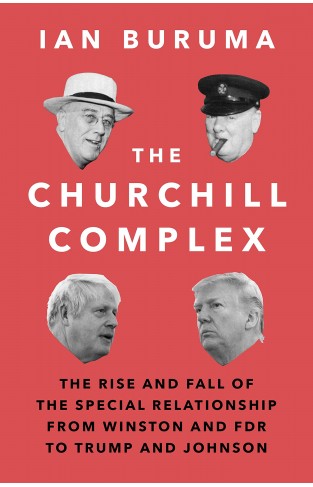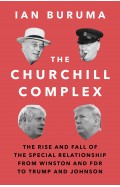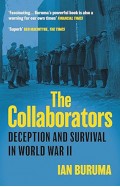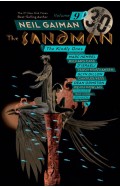- Home
- Non Fiction
- History
- Political
- The Churchill Complex: The Rise and Fall of the Special Relationship from Winston and FDR to Trump and Johnson
The Churchill Complex: The Rise and Fall of the Special Relationship from Winston and FDR to Trump and Johnson
By: Ian Buruma
-
Rs 1,695.75
- Rs 1,995.00
- 15%
You save Rs 299.25.
Due to constant currency fluctuation, prices are subject to change with or without notice.
'Rich and rewarding' Wall Street Journal
It is impossible to understand the last 75 years of British and American history without understanding the Anglo-American relationship, and specifically the bonds between presidents and prime ministers. FDR of course had Churchill; JFK famously had Macmillan, his consigliere during the Cuban Missile Crisis. Reagan found his ideological soul mate in Thatcher, and George W. Bush found his fellow believer, in religion and in war, in Tony Blair.
In a series of shrewd and absorbing character studies, Ian Buruma takes the reader on a journey through the special relationship via the fateful bonds between president and prime minister. It's never been a relationship of equals: from Churchill's desperate cajoling and conniving to keep FDR on side, British prime ministers have put much more stock in the relationship than their US counterparts did. For Britain, resigned to the loss of its once-great empire, its close kinship to the world's greatest superpower would give it continued relevance, and serve as leverage to keep continental Europe in its place. As Buruma shows, this was almost always fool's gold.
And now, as the links between the Brexit vote and the 2016 US election are coming into sharper focus, it is impossible to understand the populist uprising in either country without reference to Trump and Boris Johnson, though ironically, they are also the key, Buruma argues, to understanding the special relationship's demise.
'Rich and rewarding' Wall Street Journal
It is impossible to understand the last 75 years of British and American history without understanding the Anglo-American relationship, and specifically the bonds between presidents and prime ministers. FDR of course had Churchill; JFK famously had Macmillan, his consigliere during the Cuban Missile Crisis. Reagan found his ideological soul mate in Thatcher, and George W. Bush found his fellow believer, in religion and in war, in Tony Blair.
In a series of shrewd and absorbing character studies, Ian Buruma takes the reader on a journey through the special relationship via the fateful bonds between president and prime minister. It's never been a relationship of equals: from Churchill's desperate cajoling and conniving to keep FDR on side, British prime ministers have put much more stock in the relationship than their US counterparts did. For Britain, resigned to the loss of its once-great empire, its close kinship to the world's greatest superpower would give it continued relevance, and serve as leverage to keep continental Europe in its place. As Buruma shows, this was almost always fool's gold.
And now, as the links between the Brexit vote and the 2016 US election are coming into sharper focus, it is impossible to understand the populist uprising in either country without reference to Trump and Boris Johnson, though ironically, they are also the key, Buruma argues, to understanding the special relationship's demise.
The Churchill Complex: The Rise and Fall of the Special Relationship
By: Ian Buruma
Rs 2,800.75 Rs 3,295.00 Ex Tax :Rs 2,800.75
The Churchill Complex: The Rise and Fall of the Special Relationship from Winston and FDR to Trump and Johnson
By: Ian Buruma
Rs 1,695.75 Rs 1,995.00 Ex Tax :Rs 1,695.75
COLLABORATORS - Three Stories of Deception and Survival in World War Ii
By: Ian Buruma
Rs 2,515.50 Rs 2,795.00 Ex Tax :Rs 2,515.50
Zubin Mehta: A Musical Journey (An Authorized Biography)
By: VOID - Bakhtiar K. Dadabhoy
Rs 892.50 Rs 1,050.00 Ex Tax :Rs 892.50
The Origins of Political Order From Prehuman Times to the French RevolutioN
By: Francis Fukuyama
Rs 4,045.50 Rs 4,495.00 Ex Tax :Rs 4,045.50
Manning Up: How the Rise of Women Has Turned Men into Boys
By: Kay Hymowitz
Rs 845.75 Rs 995.00 Ex Tax :Rs 845.75
The Obama Syndrome: Surrender At Home War Abroad
By: Tariq Ali
Rs 1,100.75 Rs 1,295.00 Ex Tax :Rs 1,100.75
The Quest For Meaning: Developing A Philosophy Of Pluralism
By: Tariq Ramadan
Rs 1,185.75 Rs 1,395.00 Ex Tax :Rs 1,185.75
The Pakistan US Conundrum Jihadists The Military And The People The Struggle For Control
By: Yunas Samad
Rs 1,185.75 Rs 1,395.00 Ex Tax :Rs 1,185.75
An Enemy We Created: The Myth Of The Taliban Al Qaeda Merger In Afghanistan 19702010
By: Alex Strick van Linschoten
Rs 4,197.50 Rs 8,395.00 Ex Tax :Rs 4,197.50
WikiLeaks: Inside Julian Assanges War on Secrecy
By: David Leigh & Luke Harding
Rs 637.50 Rs 850.00 Ex Tax :Rs 637.50
No similar books from this author available at the moment.
Millionaire Success Habits: The Gateway to Wealth & Prosperity - Hardcover
By: Dean Graziosi
Rs 5,095.75 Rs 5,995.00 Ex Tax :Rs 5,095.75
Sandman Vol. 9: The Kindly Ones 30th Anniversary Edition (The Sandman)
By: Neil Gaiman
Rs 3,820.75 Rs 4,495.00 Ex Tax :Rs 3,820.75
Sherlock Holmes: The Bruce-Partington Plans (Easy Classics): 17
By: Arthur Conan Doyle
Rs 1,347.50 Rs 2,695.00 Ex Tax :Rs 1,347.50
Rumi The Book Of Love Poems Of Ecstasy And Longing
By: Coleman Barks
Rs 3,055.50 Rs 3,395.00 Ex Tax :Rs 3,055.50
Zubin Mehta: A Musical Journey (An Authorized Biography)
By: VOID - Bakhtiar K. Dadabhoy
Rs 892.50 Rs 1,050.00 Ex Tax :Rs 892.50
The Churchill Complex: The Rise and Fall of the Special Relationship
By: Ian Buruma
Rs 2,800.75 Rs 3,295.00 Ex Tax :Rs 2,800.75
The Churchill Complex: The Rise and Fall of the Special Relationship from Winston and FDR to Trump and Johnson
By: Ian Buruma
Rs 1,695.75 Rs 1,995.00 Ex Tax :Rs 1,695.75
COLLABORATORS - Three Stories of Deception and Survival in World War Ii
By: Ian Buruma
Rs 2,515.50 Rs 2,795.00 Ex Tax :Rs 2,515.50
















-120x187.jpg?q6)





-120x187.jpg?q6)



-120x187.jpg?q6)





















